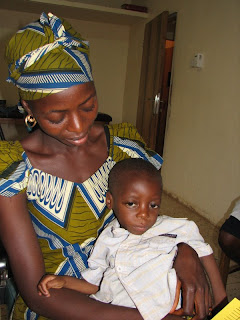
One of my great concerns are the number of deaf patients I encounter every week. Today was an exceptionally bad day. Of the 28 patients I saw today, five wanted something done for their deafness. They were as follows:
1. A 45 year old man was also treated for a febrile illness and came up completely deaf.
2. An 18 year old well dressed young man was treated for a febrile illness with antimalarial drugs. After taking the drugs for five days he could no longer hear.
3. A six year old boy had meningitis in early March. After he had recovered from his meningitis, he was deaf.
4. A two year old boy has never been able to speak or hear according to his mom. Though she admits that he did have a severe illness when he was one year old.
5. A four year old boy was treated for severe infection with unknown drugs in an outlying hospital two months ago. He has not been able to hear since then.

Most of the patients I see have preventable causes of deafness. In the developed world, we have vaccines to prevent meningitis and measles, but most Nigerian children do not get all the vaccines that are available in the developed world. In the West, we rarely use a toxic but effective antibiotic called gentamycin, but here it is used very commonly and blood levels are not monitored as we would do in the West. In America, the Food and Drug Administration and our legal system keep our drugs safe and pure, but in Nigeria NAFDAC (the FDA equivalent) is not able to keep the drugs safe.
The impure drugs are most concerning to me. Many patients have told me that they took an antibiotic like chloramphenicol or an antimalarial like fansidar and have subsequently lost their hearing. These drugs should not cause hearing loss. I strongly suspect, though I have yet to be able to prove it, that the drugs have been laced or even replaced with an antimalaria drug called quinine which is toxic to the ear. Unfortunately, it is hard to prove without the actual drug in hand that caused the hearing loss. I have only had one patient who stopped taking the drug immediately and brought the unused drug back to me. We have sent the drug for testing.
I estimate that I have seen at least one hundred patients with preventable deafness. I know I am only seeing the tip of the iceberg. There must be tens of thousands, if not hundreds of thousands of deaf patients in this country of 140 million. The options for the hearing impaired are limited. If a patient has enough hearing left so that a hearing aid could help, there are few places to get aids (our hospital being one of them). In America, a cochlear implant is an option, but this costs $40,000 to $50,000, which is almost a lifetime of earnings for most Nigerians. To make it even less accessible, the surgery is not done in Nigeria, but only in developed countries. Consequently, all I have to offer patients is that they try to find some of the few resources for deaf patients and learn sign language. I find this most unsatisfactory, and I wish I could offer them more.
For now, I do my best to try to educate the doctors that come through my department and let them know that there is an epidemic out there. Most Nigerian doctors seem unaware of the problem, since the deaf patients don’t return to the doctor who prescribed the medicine that made them deaf.
Michael Mitchell, MD

No comments:
Post a Comment